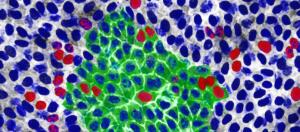por
John R. Fischer, Senior Reporter | July 26, 2019

Low doses of radiation boost
the number of cancer-capable
cells with p53 mutations
Administering low radiation doses equivalent to that of three CT scans may boost the number of cancer-capable cells over normal cells in healthy tissue, according to a new study.
Researchers at the Wellcome Sanger Institute and the University of Cambridge have found that low doses of radiation increase the number of cells with mutations in p53, a genetic change associated with cancer. They argue that such a risk should be privy to radiation safety assessments.
“The reduction in radiation exposure is desirable, and limiting imaging and using optimized scanning protocols are important ways forward,” professor Phil Jones of the Wellcome Sanger Institute and MRC Cancer Unit at the University of Cambridge, and Dr. David Fernandez-Antoran of the Wellcome Sanger Institute, told HCB News. “This research does not deal with humans but does provide a further argument to support these efforts.”



Ad Statistics
Times Displayed: 16169
Times Visited: 33 Final days to save an extra 10% on Imaging, Ultrasound, and Biomed parts web prices.* Unlimited use now through September 30 with code AANIV10 (*certain restrictions apply)
Information on the impact from exposure to low levels of radiation is limited, making it challenging for clinicians to learn and understand the true risk of low radiation doses. All humans carry cancer-capable mutant cells in healthy tissue, including those with p53 mutations. Cells with this mutation increase in number as a person ages, though very few turn into cancer.
The authors examined the impact of radiotherapy on these cells in mice with oesophagus cancer, delivering a dose of 50 milligray to each specimen — the equivalent of three or four CT scans — and observed a spread of p53 mutant cells, which outcompeted healthy ones.
While the outcome was negative, another discovery was made when feeding mice before radiation treatment with N-Acetyl Cysteine (NAC), an antioxidant. The specimen's healthy cell number grew, outcompeting and replacing the p53 mutant cells. The antioxidant alone, however, without radiation, did not help normal cells destroy the mutations, proving that long-term use of antioxidants by themselves does not prevent cancer.
Jones and Fernandez-Antoran say further evaluation is required to determine the effect of their findings on other tissues and before any suggestions can be made on altering CT scan practices.
“Redox manipulation via low dose radiation and antioxidants may have beneficial effects in mouse esophagus. We see the way forward for this work as developing new treatments, not linked to radiation, that alter oxidative stress in beneficial ways,” they said. “There is currently no evidence to justify a change in CT scan practice.”
The findings were published in the journal,
Cell Stem Cell.

